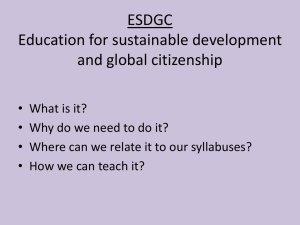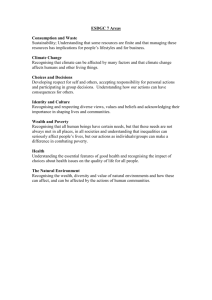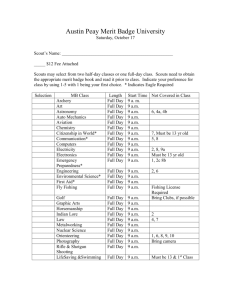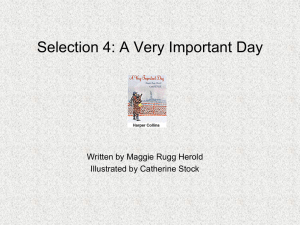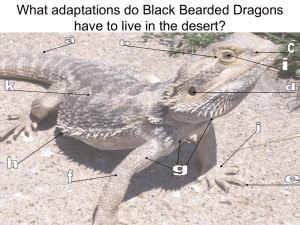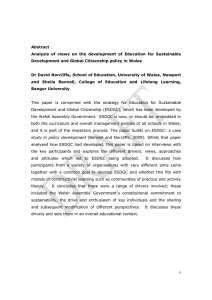Foundation Phase ESDGC books and ideas
advertisement
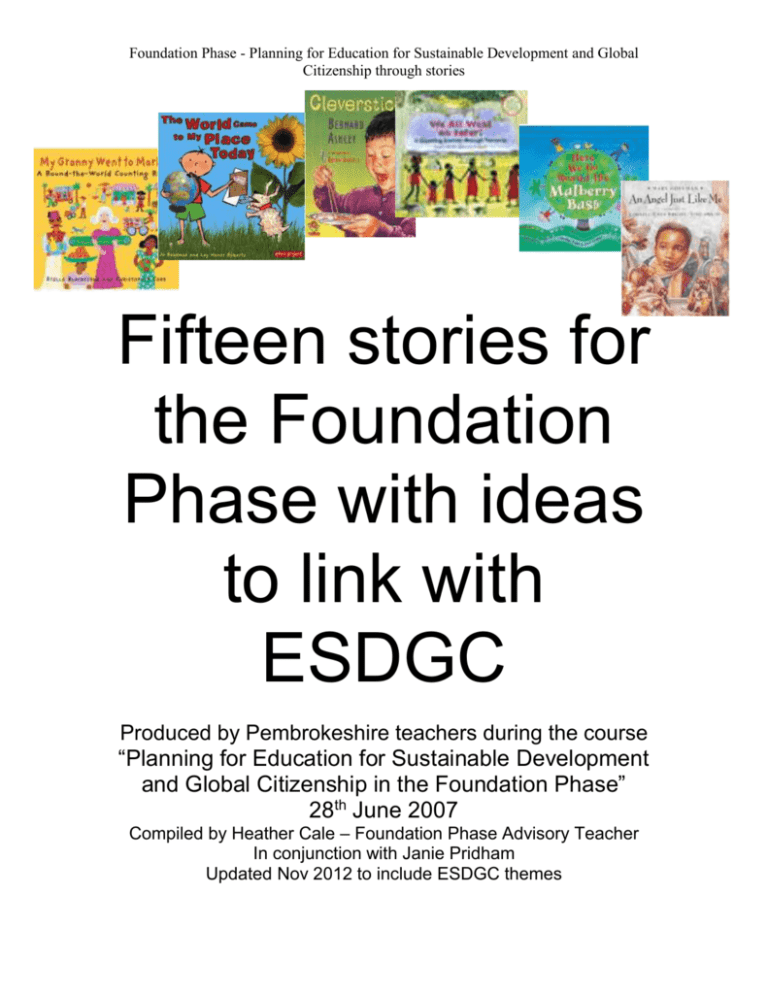
Foundation Phase - Planning for Education for Sustainable Development and Global Citizenship through stories Fifteen stories for the Foundation Phase with ideas to link with ESDGC Produced by Pembrokeshire teachers during the course “Planning for Education for Sustainable Development and Global Citizenship in the Foundation Phase” 28th June 2007 Compiled by Heather Cale – Foundation Phase Advisory Teacher In conjunction with Janie Pridham Updated Nov 2012 to include ESDGC themes Foundation Phase - Planning for Education for Sustainable Development and Global Citizenship through stories Story: Amazing Grace Author: Mary Hoffman Illustrations: Caroline Binch ESDGC themes: culture and identity choices and decisions Key Concepts of ESDGC: Interdependence Needs and Rights Diversity Conflict Resolution Personal & Social Development, Well Being & Cultural Diversity: - Becoming aware own feelings and emotions and identifying those of others. - Recognising differences and cultural differences and diversity. - Respects others and values their achievements - Develops self esteem - Questions stereotypes Creative Development: Language, Literacy and Mathematical Development: - Performance Communication: Explores stories within text Counting - Making puppets, costumes, Performances – puppets, Time posters pantomimes etc. - Music – listening to jungle Advertisements music etc Story Telling Creating music and sound effects World Art Historical Art Physical Development: Knowledge and Bilingualism: Dance and movement Theatre role play Understanding of the related to various animals Story Vocabulary World: Explore historical figures and characters. and stories Identify places Investigation of own town facilities, transport etc Trip to local theatre. Additional Resources to enrich child-initiated activities Water Play Pirate Ship Sand Play Creative Area Junk for model making Construction Area Wood, boxes Investigation Area Globes maps ICT Area Bee-bot and town plan Outdoor Area Role Play Puppet theatre Pirate ship Indian camp Materials/fabrics Messy Play Miniature jungles Soil, grass etc Writing Area Card for theatre tickets Paper for programmes Large paper for posters Maths Area Mini elephants Spiders Tuff Spot Island landscape Foundation Phase - Planning for Education for Sustainable Development and Global Citizenship through stories Story: Cleversticks Key Concepts of ESDGC: Interdependence Diversity Author: Bernard Ashley Illustrations: Derek Brazell ESDGC Themes: culture and identity choices and decisions Personal and Social Development, Well Being and Cultural Diversity: Recognising differences - Recognising individual strengths - Helping others Sharing – Perseverance - Overcoming difficulties - Self -esteem Language, Literacy and Mathematical Creative Development: Communication: Paintings using different Development: Sequencing activities brushes/ chopsticks/ tools. Phonic work – Names Threading with laces Music: Use chopsticks and Creative Writing – What do Pairing / matching / sorting paper plates to create own we like doing? Measuring using chopsticks patterns of sound. Poems – “I am good at…” etc e.g. How many buttons make Copying rhythms etc. up the length of a chopstick? Knowledge and Physical Development: Bilingualism: Vocabulary of clothing Understanding of the World: Clown movements Learning about countries that Juggling – use balls to play Days of week use chopsticks. with. What food do we eat with chopsticks? How do others eat? What utensils are used? Use globes and atlases to investigate countries. Uses of water, washing, swimming etc. Additional Resources to enrich child-initiated activities Water Play Washing toy baby Different utensils Construction Area Outdoor Area Juggling activities Circus skills e.g. ribbons Sand Play Creative Area Use chopsticks to Craft materials to pick and move make clowns e.g. objects. wobbly eyes. Find own letters in Paint names sand and pick up with chopsticks. Investigation Area ICT Area Different fastenings Use paint package e.g. laces, buttons, for drawing Velcro etc clowns Role Play Big top circus area Clown performing Messy Play Rice activities Writing Area Maths Area Measuring apparatus. Threading on shoelaces Tuff Spot Using chopsticks to pick up items Foundation Phase - Planning for Education for Sustainable Development and Global Citizenship through stories The Swirling Hijaab Author: Na’ima Bint Robert Illustrations:Nilesh Mistry Key Concepts of ESDGC: Diversity ESDGC Themes: culture and identity Story: Personal & Social Development, Well Being & Cultural Diversity: - Recognising similarities and differences - Festivals – Hindu Wedding Language, Literacy and Communication: What did your hijaab become? Mathematical Development: Pattern – shapes Measuring a square of material for a purpose Creative Development: Pattern Different music from various lands Knowledge and Understanding of the World: Travel Different homes/ food Investigating different materials – testing for sails, homes tents etc. Physical Development: Bilingualism: Pattern printing Making boats Scarf dance Food Houses Family members Additional Resources to enrich child-initiated activities Water Play Boats Sand Play Desert Creative Area Drapes for tents Writing Area postcards Construction Area Make a fort Investigation Area Globes Different materials Religious artefacts Maths Area picnic 1:1 correspondence Food shop Outdoor Area Journeys Role Play Costumes for story characters ICT Area Bee-bot – taking a journey through the story sequence 2 Simple city Messy Play/ Cooking Sandwiches Fresh orange juice Tuff Spot Desert Foundation Phase - Planning for Education for Sustainable Development and Global Citizenship through stories Story: My Granny went to Market Author: Stella Blackstone Illustrations: Christopher Corr Key Concepts of ESDGC: ESDGC Themes: Citizenship and culture and identity Stewardship choices and decisions Diversity Consumption and waste Interdependence Wealth and poverty Personal & Social Development, Well Being & Cultural Diversity: - Recognising Differences Language, Literacy and Communication: Lists of shopping Continuation of the book in writing Poems Creative Writing – write a similar book about Wales Mathematical Development: Counting Matching Finding Differences Sorting Shopping Knowledge and Understanding of the World: Identify places Learning about different countries Weather Clothing Physical Development: Dance from different countries Boomerangs Frisbee throwing Kite flying Creative Development: Music form each country including instruments Masks Crafts Weaving Lanterns Making kites Boomerangs Bilingualism: Country names in Welsh Vocabulary of colour Place names Additional Resources to enrich child-initiated activities Water Play Sailing boats Items to investigate Floating/sinking Construction Area lanterns Outdoor Area Market stalls Theatre Musical instruments Sand Play Red sand Animals/objects Linked with Australia Investigation Area Maps Brochures postcards Role Play Travel agents Creative Area Resources for: Kite making Weaving masks ICT Area Global earth maps Messy Play Ice cubes Shaving foam Coloured sand Writing Area Postcards Shopping lists Diaries Maths Area Russian dolls Shopping bags Sorting resources Tuff Spot African Animals Foundation Phase - Planning for Education for Sustainable Development and Global Citizenship through stories Story: We all went on Safari Author: Laurie Krebs Illustrations: Julia Cairns Key Concepts of ESDGC: ESDGC Themes: Interdependence culture and identity Citizenship – Stewardship choices and decisions Diversity natural environment Personal & Social Development, Well Being & Cultural Diversity: - Working together to achieve an outcome - Understanding that actions have consequences - Recognising differences - Family and culture - Taking part in classroom responsibilities / Turn-taking and sharing Language, Literacy and Mathematical Creative Development: Animal songs Communication: Development: Rhyme Time Animal patterns / Shields Phonic Work Counting activities A day in the life of an animal Work about animals Sorting activities Camouflage / Jewellery Animal poems/stories Matching activities Music from Africa Alliteration Measuring African Art Comparing Tree rubbings Knowledge and Physical Development: Bilingualism: Animal Movements Vocabulary of animals Understanding of the Dance Vocabulary of environments World: Comparing Africa with the Travelling as animals Number names local environment African Names Animal Classification Animal environments Animal Homes Identify places on globe Endangered species Additional Resources to enrich child-initiated activities Water Play Plastic sea creatures e.g. hippo, crocodile Construction Area Plants in pots Jeeps Things with wheels Outdoor Area Sand Water Soil Sand Play Rice Investigation Area Globes/Maps Atlases African Artefacts Role Play African tribal dress Safari/ tents / jeep Binoculars Creative Area Resources to encourage making of jewellery/ animals ICT Area Bee-Bot Global Earth Google: Africa photos Messy Play Clay Paint Writing Area Animal shapes paper Letters/envelopes clipboards Maths Area Animals to count Calculators Tuff Spot African Animals Journey layout Foundation Phase - Planning for Education for Sustainable Development and Global Citizenship through stories Story: Jamela’s Dress Key Concepts of ESDGC: Diversity Interdependence Author: Niki Daly Illustrations: Niki Daly ESDGC Themes: culture and identity choices and decisions wealth and poverty Personal & Social Development, Well Being & Cultural Diversity: - Recognising cultural Differences - Taking part in classroom responsibilities Language, Literacy and Communication: Rhyming Countries Greetings Languages Nursery Rhymes Mathematical Development: Pattern making Time Money – British & foreign Length/Measuring Creative Development: Music from around the world Multicultural patterns Printing patterns Material for clothes Taking photographs Knowledge and Understanding of the World: Learning about different countries Traditional Clothes Celebrations Local Newspapers Physical Development: Hand clapping games Moving in different ways e.g. swirling and turning Bilingualism: Vocabulary of Colours Buying in the shop Additional Resources to enrich child-initiated activities Water Play Soap powder Wash board Scrubbing brushes Sand Play Confetti Rice Flower petals Construction Area Wheels Tyres Large material Investigation Area Globes Maps Artefacts Outdoor Area Washing line Pegs Sheets Tyres Wheels Role Play Clothes shop Wedding clothes Creative Area Materials and drapes Binka - cross-stitch Needles for sewing Stamps for printing ICT Area Camera Global Earth Writing Area Wedding invitations Old newspapers Messy Play Cooking area: Wedding cakes Tuff Spot Paints Wet mud Tyres – tyre prints Maths Area Tape Measures Rulers Foundation Phase - Planning for Education for Sustainable Development and Global Citizenship through stories Story: My Grandpa and the Sea Author: Katherine Orr Key Concepts of ESDGC: Interdependence Citizenship and Stewardship Sustainable Change ESDGC Themes: natural environment choices & decisions culture & identity wealth & poverty Personal & Social Development, Well Being & Cultural Diversity: - Recognising different lifestyles - Recognising jobs people do - Understanding that their own actions have consequences - Identifying similarities and differences Language, Literacy and Mathematical Creative Development: Make and decorate varieties Communication: Development: Phonic work linking sea life Number, size, length, of fish and vegetation weight of fish, shapes, 3D constructions Lists of fish, sea food counting, sorting, shopping Music from around the Sea Poems e.g. “The waves world come in they bring me a …” Sea shanties “Fat fish, thin fish…”etc. Banana prints Knowledge and Physical Development: Bilingualism: Vocabulary of food Understanding of the World: Moving like fish Handling and observing fresh Fishing with net Vocabulary of travel fish. Healthy eating The family Identifying places- globe/ map Comparing diets Grandparents Navigating routes to get to different places Lifestyles of different families Additional Resources to enrich child-initiated activities Water Play Sand Play Creative Area Writing Area Fish Shells Construct a Postcards Boats – navigating Conch fishing net Resources for pattern around rocks Different coloured Threads making Underwater sands Wax Construction Area Investigation Area ICT Area Maths Area Equipment to build Globes Researching Calculators boats Atlases / Maps Bee-bit and floor Weighing / Measuring Compasses plan Different sizes of fish Outdoor Area Role Play Messy Play Tuff Spot Fishing nets to Fish shop Cooked rice Islands trawl Boat agency Moulds Boats travelling Pebbles, fish, shell Sailing the coast Sight seeing Foundation Phase - Planning for Education for Sustainable Development and Global Citizenship through stories Story: An Angel Just Like Me Author: Mary Hoffman Illustrations: Ying-Hwa Hu Cornelius Van Wright ESDGC Themes: choices & decisions culture & identity Key Concepts of ESDGC: Diversity Citizenship &Stewardship Values and Perceptions Personal and Social Development, Well Being and Cultural Diversity: - Recognising and becoming increasingly sensitive to the needs of others - Knowledge of familiar care routines - Support, comfort and help other children when they are upset or sad. - Awareness of similarities and differences between self and peers - Ability to express feelings - Coping with disappointment - Know that people have different preferences - see things from point of view of others - Identify a problem and think of solutions Language, Literacy and Mathematical Creative Development: Making different Communication: Development: Personal experiences of Counting Decorations decorations Christmas Sorting Decorations Decorations Lists – Letters Shopping – money Christmas songs Celebrations in other Time Food from around the world countries Money Decorate a tree Decorations – phonic work Symmetry Christmas Music Stories about Father Matching Drama Christmas Bilingualism: Knowledge and Physical Development: Christmas Food Christmas Vocabulary Understanding of the Dances from different Greetings World: Identifying places on globe countries Food different countries Action songs Decorations Sustainable Transport Christmas Story Additional Resources to enrich child-initiated activities Water Play Winter time Ice Snow Construction Area Resources to make stars, stables etc Outdoor Area Visit to shops to see decorations Decorate outdoors for Christmas Sand Play Camels – Desert 3 kings Investigation Area Scents of Christmas Globes/ Atlases Role Play Nativity Santa’s Grotto Creative Area Glitter Templates Decorations ICT Area Search – Angels in different cultures Cooking/Messy Play Angel cutters Salt Dough Cake ingredients Writing Area Letters - Lists Catalogues – Cards Envelopes Maths Area Calculators Till for shopping Box nets/grids Tuff Spot Winter wonderland Nativity Icing Sugar Foundation Phase - Planning for Education for Sustainable Development and Global Citizenship through stories Story: Author: Mary Hoffman Illustrations: Karen Littlewood The Colour of Home Key Concepts of ESDGC: ESDGC Themes: Quality of life choices & decisions Needs and rights culture & identity Personal & Social Development, Well Being & Cultural Diversity: - Recognises differences and similarities - Human rights - Refugees – Story about child having to move country and why Language, Literacy and Communication: Travel – ways of travelling round the World Different ways of Communicating – signing Words in Somalia Barnaby Bear Knowledge and Understanding of the World: Finding out about Somalia - books – internet – globe Clothes worn in different countries Water in the dry season Mathematical Development: Numbers of people in the family Animals/Pets Sorting animals Graph work Time Capacity – water Physical Development: Travelling Traffic lights Game National dances Creative Development: Representing own home Drama: How does he feel? What sort of music would He hear? Happy/Sad sounds Water music Water in bottles to make different sounds Bilingualism: Colours Feelings Likes/dislikes Additional Resources to enrich child-initiated activities Water Play Boats Sand Play Dry earth – exploring effects of water Construction Area Materials to make boats/ vehicles Animals from different cultures Outdoor Area Exploring shadows sundial Investigation Area Globes Maps Types of food Role Play Colourful Home Travel Agent Creative Area Resources for exploring colours using different resources ICT Area Internet Maps Bee-Bot Journeys Writing Area Postcards Messy Play Tuff Spot Animals in soil Maths Area Clocks Watches Foundation Phase - Planning for Education for Sustainable Development and Global Citizenship through stories Story: Author: Carolyn Curtis I took the moon for a walk Illustrations: Alison Jay Key Concepts of ESDGC: Values and Perceptions ESDGC Themes: natural environment culture & identity Personal & Social Development, Well Being & Cultural Diversity: - How we treat each other - Respect for others - Feelings - Taking care of each other Language, Literacy and Mathematical Creative Development: Junk modelling Communication: Development: Journeys tall and short Mobile Describing day over and under Sky scenes Wishes time Cloud spotting calendar Making trains The Planets - Holst Knowledge and Physical Development: Bilingualism: space rockets – travelling Animals Understanding of the tiptoe – giant Feelings World: Reflections using mirrors steps Colours Map of Journey of the man on the moon Songs moon Dance Activities The world at night Night animals Additional Resources to enrich child-initiated activities Water Play Floating objects Swans, boats Reflections Construction Area Bridge Building Resources Lego Polydron Sand Play Bridges Tracks Paths Investigation Area Mirrors Stars Torches Puppets Creative Area Balloons Papier mache Train whistles ICT Area NASA images Planets Space information Outdoor Area Role Play Rocket Astronauts Messy Play Cotton wool Glitter/foil Writing Area Stars Letters Maths Area Circular shapes Tuff Spot Spaghetti Gloop Texture Foundation Phase - Planning for Education for Sustainable Development and Global Citizenship through stories Story: Here we go round Author: Fred Penner Illustrations: Sophie Fatus the Mulberry Bush Key Concepts of ESDGC: ESDGC Themes: Cultural Diversity/ culture & identity Citizenship choices & decisions Interdependence natural environment Personal & Social Development, Well Being & Cultural Diversity: - Tolerance and acceptance - Daily routines: hygiene - recognising differences Language, Literacy and Mathematical Creative Development: Make different breakfasts – Communication: Development: rhyming words pattern – fabrics paper plates singing songs data handling – How do we Patterns in World Art writing own travel story come to school? Printing fabrics water poems Capacity Printing with berries etc e.g. Quantities and 1-1 staining correspondence Singing songs from around the world Knowledge and Physical Development: Bilingualism: Action songs Multilingual greetings Understanding of the Miming Personal routines World: sequencing daily routine Dressing and undressing Singing songs about day/night washing plants uses of water tasting different breakfasts cooking breakfast e.g. toast etc. Additional Resources to enrich child-initiated activities Water Play washing up washing dolls filling and emptying Construction Area Transport Clay pots/bowls Outdoor Area Journeys – packing bags and travelling using bikes etc Sand Play Combs and brushes for pattern making Investigation Area Fabrics Saris mirrors Role Play Hair dressers Home corner - bedrooms/kitchen Creative Area Toothbrushes Ribbon weaving Making “cheerio” necklaces ICT Area Recording own singing Global Earth Messy Play Foam – mark making Writing Area Chinese writing tools Natural objects to make symbols Maths Area Shapes Buttering different shaped toast Tuff Spot Cereals Porridge Foundation Phase - Planning for Education for Sustainable Development and Global Citizenship through stories Story: Grace and Family Author: Mary Hoffman Illustrations: Caroline Binch Key Concepts of ESDGC: ESDGC Themes: Cultural Diversity culture & identity choices & decisions Personal & Social Development, Well Being & Cultural Diversity: - Feelings and emotions - Empathy towards others - Relationships in families - Respect for different cultures - People who are special to me Language, Literacy and Mathematical Creative Development: African Music and Communication: Development: Creative Writing Shopping activities instruments Letter writing/postcards - buying water melons, African Art Traditional stories from shoes etc in the market Looking at clothing patterns other countries - Weighing activities Pattern making Luggage labels - Matching activities Printing Rainbows Tie dye Knowledge and Physical Development: Bilingualism: African Dance Names of family members Understanding of the Crocodile Movements Vocabulary of travel World: Finding out about different Farewell party Names of animals countries Plans of journeys Transport, tickets etc Globe work Family trees / Weather Additional Resources to enrich child-initiated activities Water Play Crocodiles Coloured water Sand Play Wet sand Animal for footprint patterns Construction Area Plants to make scenes when building Investigation Area Globe Reference books Maps Outdoor Area Outdoor market Role Play Hairdressers Shopping – day at the market Traditional clothes Creative Area Fruit for printing Sketching materials Fabric crayons ICT Area Global Earth 2Simple Software – design patterns for garments Messy Play/Cooking Traditional dishes Swamps – mud and water Writing Area Luggage Labels Postcards Maths Area Items for pattern making Tuff Spot Lime jelly – swamp Stones, pebbles Small world animals Foundation Phase - Planning for Education for Sustainable Development and Global Citizenship through stories Story: Gregory Cool Author: Caroline Binch Key Concepts of ESDGC: ESDGC Themes: Diversity choices & decisions Conflict Resolution culture & identity Citizenship/Stewardship natural environment Quality of life Values and perceptions Personal & Social Development, Well Being & Cultural Diversity: - Recognising differences - Being sensitive to the needs of others - Expressing feelings Language, Literacy and Mathematical Creative Development: Collage Communication: Development: Diary Activities Counting activities Clay model houses Discussions about feelings Time World music Listing differences and Sorting Painting using book as similarities Temperature stimulus Descriptions Continuing the story Knowledge and Physical Development: Bilingualism: Needing food and drink for Naming locations Understanding of the health Naming animals World: Food Keeping cool Times of day Identifying places on globe Swimming Family members Learning about different Climbing countries Gymnastics Navigating Routes Additional Resources to enrich child-initiated activities Water Play Boats Nets Dolphins/sharks Construction Area Boxes Bricks for houses stilts Outdoor Area Beach area Making shade area Picnic area Sand Play Pebbles Water Shells Sticks Palm Leaves Investigation Area Globes Atlas Maps Coconuts Role Play Airport/aeroplane Picnic area Creative Area Copies of pictures Paints Junk modelling Writing Area diaries postcards ICT Area Global Earth Sounds of insects Maths Area Shells pebbles clocks thermometers Tuff Spot Rice-dyed Cooking Activities Hot spicy food tasting Coconut ice Picnic food Foundation Phase - Planning for Education for Sustainable Development and Global Citizenship through stories Story: We’re going on a Lion Hunt Author: David Axtell Key Concepts of ESDGC: ESDGC Themes: Diversity choices & decisions Citizenship natural environment Values and perceptions culture & identity Personal & Social Development, Well Being & Cultural Diversity: - Problem solving - Respect for diversity - Desire to participate - Negotiation - Creativity Creative Development: Language, Literacy and Mathematical Communication: Collage work using Development: Prepositions work Counting animals different textures Sequencing the story in drama Sorting by type/colour Camouflage Initial blends work e.g. sw, squ, Counting in 2’s Mixing colours to make spl etc. Pattern making shades of green Knowledge and Understanding of the World: Geographical features Mapping the story using geographical features Positional language Physical Development: Physical journey in drama/movement Movement connected to positional language Moving like animals Bilingualism: Geographical features Language of moving in different ways Colours Animal names Additional Resources to enrich child-initiated activities Water Play Small world animals Moving water using implements Construction Area Plants Sand Green fabric animals Outdoor Area Use of long grass area to retell story and apparatus to represent locations. Sand Play Using sand to map out the journey - drawing in sand using sticks Investigation Area Globes Maps Atlases Role Play African costumes Location resources Creative Area Textured paper Patterned paper Stencils Junk modelling ICT Area Google earth Scene making Bee-bot and floor plan Messy Play Mud Water Sand grass Writing Area Large paper for mapping Word cards – positional Blend word cards Maths Area animals printing materials for pattern making Tuff Spot Different ground surfaces Pebbles Characters Animals Foundation Phase - Planning for Education for Sustainable Development and Global Citizenship through stories Story: The World Came to Author: Jo Readman and Ley Honor Roberts My Place Today Key Concepts of ESDGC: ESDGC Themes: Interdependence choices & decisions Citizenship and stewardship climate change / health Diversity natural environment Personal & Social Development, Well Being & Cultural Diversity: - Recognising that we can all work together to achieve an outcome - Understanding that actions have consequences - Recognising differences - Turn taking and sharing - Taking part in classroom responsibility - Recognising the jobs other people do Language, Literacy and Mathematical Development: Creative Shopping Activities Communication: Development: Phonic work linking food, Sorting activities Music from around countries, modes of Counting activities the world transport to letters of the Matching activities Travelling songs alphabet Weighing and measuring World art Lists of food List of ways of travelling Creative writing – where would I go? Knowledge and Physical Development: Bilingualism: Using our bodies to travel in Vocabulary of Understanding of the different ways food World: Identifying places on the Needing food for health Vocabulary of globe travel Learning from different Buying in the shop countries Postman activities Navigating routes Additional Resources to enrich child-initiated activities Water Play Boats Straws Sand Play Puffed rice Creative Area Things to make boats Construction Area Wheels Plants in pots Outdoor Area Sand Ropes Journeys Assault course Investigation Area Globes/atlases maps Role Play Shops/supermarket Travel agent ICT Area Global earth Bee-bots/floor plans Cooking Area Pizza bases Tomato sauce Cheese Writing Area Letters Envelopes Clipboards Maths Area calculators food to sort/count Tuff Spot Trains Journey layout
